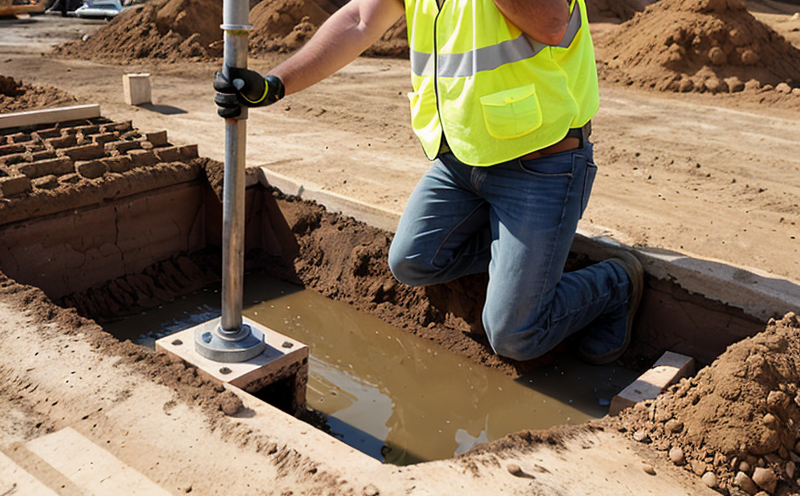ASTM D5778 Cone Penetration Testing
The ASTM D5778 Cone Penetration Test (CPT) is a widely used geotechnical testing method for characterizing soil properties and evaluating the in-situ bearing capacity of foundations. This non-destructive test allows engineers to gather essential data on soil behavior under applied loads, which is critical for designing safe and efficient building structures.
The CPT involves driving a conically shaped penetrometer into the ground at controlled rates while measuring the resistance encountered by the cone tip and sleeve. The resulting penetration resistance (qv) and sleeve friction (u) are recorded as depth intervals, providing valuable information on soil density, cohesion, and internal friction angle.
The test is particularly useful in complex environments where traditional sampling methods may be impractical or destructive. It can assess both granular and cohesive soils, making it a versatile tool for various construction phases. The data obtained from CPT helps ensure that the foundation design accurately reflects the soil conditions encountered at the project site.
The standard ASTM D5778 specifies the procedure for conducting these tests, ensuring consistency and comparability of results across different projects and regions. This standard is recognized globally for its reliability in providing a detailed profile of subsurface soils.
In the context of building & infrastructure testing, CPT plays a crucial role in:
- Evaluating soil stratigraphy
- Identifying potential weak layers within the foundation soil
- Assessing load-bearing capacity of soils for footing design
- Monitoring changes in subsurface conditions during construction
- Providing input parameters for geotechnical models and simulations
The accuracy and precision of CPT data contribute significantly to the overall success of a project, ensuring that foundations are designed and constructed with the appropriate load-bearing capacity. This helps prevent costly reworks or structural failures due to miscalculated soil properties.
Engineers often use this test in conjunction with other geotechnical techniques to gain comprehensive insights into the subsurface environment. The combination of CPT data with results from other tests such as standard penetration tests (SPT) and soil sampling allows for a more robust design process that considers all relevant factors.
Why It Matters
The importance of accurate geotechnical testing cannot be overstated, especially in the context of building & infrastructure projects. Reliable data from tests like CPT directly influences the safety and longevity of structures. By providing precise information on soil properties, these tests help prevent failures caused by underestimating load-bearing capacity or misjudging subsurface conditions.
For example, consider a scenario where a developer is constructing a high-rise building in an area with heterogeneous soil layers. If CPT data shows that there are weak spots within the foundation soil, proper design adjustments can be made to ensure the building’s stability and safety. Without such testing, the risk of structural collapse or uneven settlement increases significantly.
The consequences of poor geotechnical evaluation extend beyond just the structure itself; they also impact surrounding infrastructure and even adjacent properties. Ensuring accurate CPT results thus becomes a priority for all stakeholders involved in the project.
Eurolab Advantages
At Eurolab, we pride ourselves on delivering high-quality geotechnical testing services that meet or exceed international standards. Our expertise in ASTM D5778 Cone Penetration Testing ensures you receive accurate and reliable results every time.
- Our team of experienced geotechnical engineers uses state-of-the-art equipment to conduct CPT tests, ensuring precise measurements and consistent data.
- We follow the latest editions of ASTM D5778, guaranteeing compliance with current standards.
- Our laboratories are equipped with advanced instrumentation for accurate penetration resistance and sleeve friction readings.
- We provide comprehensive reports that include detailed profiles of subsurface soil properties, making it easier to integrate test results into design processes.
In addition to our technical capabilities, Eurolab offers exceptional customer service. Our team works closely with clients throughout the testing process, ensuring clear communication and timely delivery of results. This collaborative approach helps us meet your specific project needs and deadlines.
Why Choose This Test
The ASTM D5778 Cone Penetration Test offers several advantages over other geotechnical testing methods:
- Non-Destructive Nature: Unlike some sampling techniques, CPT does not require the removal of soil samples from their natural environment. This minimizes disturbances to the surrounding soil and provides more representative data.
- Faster Data Collection: The test can be conducted relatively quickly compared to other methods like standard penetration tests (SPT), which reduces project timelines without compromising accuracy.
- Broad Applicability: CPT is suitable for a wide range of soil types, including sands, gravels, silts, and clays. This versatility makes it an ideal choice for diverse project sites.
- In-Situ Testing: By testing the soil in its natural state, CPT provides more accurate representations of the actual conditions that a structure will encounter during construction.
- Data Integration: The comprehensive dataset from CPT can be easily incorporated into various design and simulation tools used by engineers. This seamless integration enhances the overall accuracy of project planning.
The combination of these benefits makes ASTM D5778 Cone Penetration Testing an indispensable tool in geotechnical engineering, offering valuable insights that contribute to the success of building & infrastructure projects.





